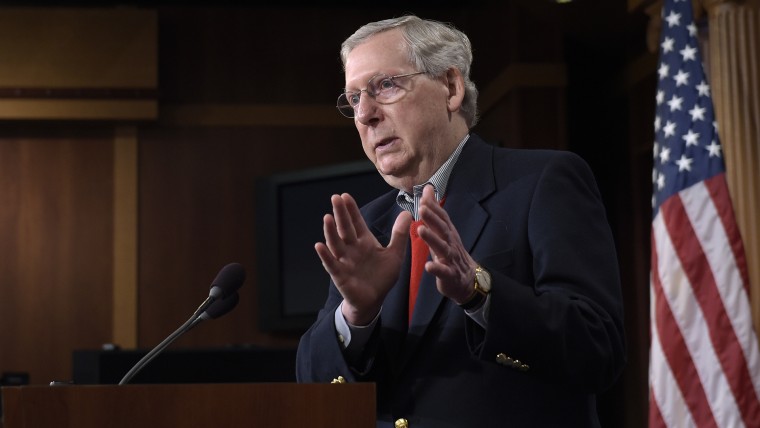Senate Majority Leader Mitch McConnell (R-Ky.) reportedly called Donald Trump on Monday to deliver what Politico described as "a reality check."
[F]ailing to repeal the law would mean the GOP would lose its opportunity to do a partisan rewrite of the law that could scale back Medicaid spending, cut Obamacare’s taxes and repeal a host of industry mandates.Instead, Republicans would be forced to enter into bipartisan negotiations with Democrats to save failing insurance markets.
To hear GOP leaders tell it, the ongoing effort to approve a far-right health care overhaul is a strictly partisan enterprise, not because Republicans want to jam their bill down the nation's throat, but because those rascally Democrats just aren't interested in playing a constructive role.
At a Capitol Hill press conference yesterday, at which McConnell announced he'd scrapped plans for a vote this week, a reporter asked if the ongoing discussions about the future of the bill might involve Democratic senators. "They're not interested in participating in this," the Republican leader replied.
In that sentence, the word "this" is doing a lot of work.
If the point is that Senate Democrats won't help Republicans take health coverage from 22 million Americans, and force much of the country to pay more for worse insurance, then sure, Dems aren't interested in "participating in this." But to say there's no room for bipartisan talks is plainly wrong.
Democrats have practically been begging to work with Republicans on health care. They've put their appeals in writing for months. GOP leaders have thus far ignored every appeal.
And yet, the president and his allies continue to whine on a nearly daily basis that congressional Dems aren't "helping" on the issue. The question Republicans seem reluctant to answer is simple: do they want a cooperative, bipartisan effort or not?
McConnell reportedly presented Trump with the idea that bipartisanship is, in a rather literal sense, the worst-case scenario. In March, House Speaker Paul Ryan (R-Wis.) characterized bipartisanship as the one course of action he simply did not want to even consider.
But it's against this backdrop that GOP officials also complain that Democrats aren't willing partners. It's like complaining that someone didn't attend your party after you failed to invite him -- and then locked the door when he showed up.
It'd be pretty easy to work out a bipartisan deal to improve the current system. It simply requires a little political will from the people insisting on ignoring nearly half the members of the Senate.
Postscript: Before anyone says, "Well, Republicans are just doing what Democrats did with their partisan Affordable Care Act," we already know that's not true. As we discussed two weeks ago, during the ACA's construction, Dems went out of their way to try to make the bill bipartisan. The entire process was put on hold for several weeks while the bipartisan “Gang of Six” -- three Democrats, three Republicans -- worked on a possible deal. Senators such as Susan Collins, Chuck Grassley, and Olympia Snowe were brought to the Oval Office for regular and repeated chats about how to find bipartisan solutions. The White House held a bipartisan televised forum to hear GOP ideas from GOP officials, and Republican amendments were accepted when the bill worked its way through committee.
There's just no comparison between that dynamic and the one currently unfolding on the Hill.
